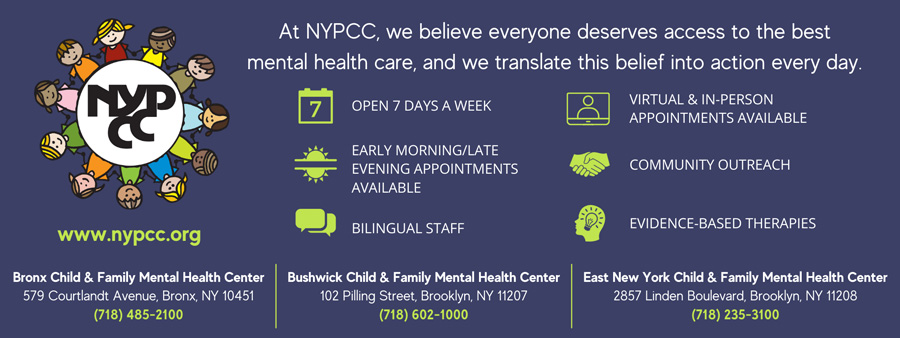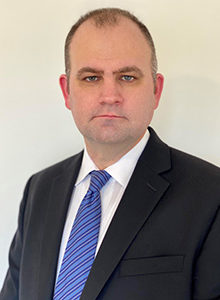As one of the largest providers of outpatient mental health services in New York State, New York Psychotherapy and Counseling (NYPCC) works together with tens of thousands of New Yorkers facing mental health challenges. NYPCC embraces a recovery-oriented, trauma-informed model of community mental health care that supports the individual in their recovery journey. Mental health recovery is a person-driven process of change through which individuals improve their health and wellness, strive to reach their full potential, and lead independent lives. NYPCC clinicians assist and inspire people to move forward with their recovery in a safe and affirming environment that respects self-determination. During the first contact with a person, NYPCC clinicians facilitate discussion of the person’s recovery goals, seek to understand the person’s resiliency, strengths, coping skills and resources that can be brought into action during the treatment process, and appraise their level of hope.

Hope, a belief that mental health challenges and conditions can be overcome, is fundamental to recovery. Hope is an essential element of mental health treatment, and many successful therapies deliberately build hope as part the therapeutic process (Weis & Speridakos, 2011). Having hope for the future also helps build resilience. Resilience is the ability to withstand adversity, bounce back more quickly after adverse experiences, and to learn and grow from difficult experiences. A person’s capacity for resilience in the face of adversity and a belief that they can resolve their mental health challenges highly correlate with successful living and positive mental health outcomes (Wu, 2011; Griggs, 2017). Hope provides individuals with will, determination, and a perception of empowerment that permits them to reach their recovery goals. When hope or resilience is lacking, it must be instilled. Hope and resilience do not simply come from a person’s internal strengths but can be fostered and nurtured by supporting and accepting the person, making them feel valued and appreciated. While hope and resilience often develop during the psychotherapeutic process, they can also come from strengthening relationships with family, friends, peers, and faith.
Now more than ever, instilling a sense of hope and building resilience are crucial for the persons NYPCC serves. During the last two years, the COVID-19 pandemic transformed the mental health landscape by improving access to care through telehealth and drawing new attention to the mental health system as soaring rates of mental health symptoms emerged. In October 2021, the American Academy of Pediatrics, the American Academy of Child and Adolescent Psychiatry, and the Children’s Hospital Association declared that the pandemic-related deterioration in child and adolescent mental health is a national emergency. COVID-19-related social isolation, school closures, and economic distress have disproportionately affected Black, Indigenous, and people of color (BIPOC) communities, whose levels of suicidality, depression, anxiety, loneliness, and drug overdose increased (Friedman et al., 2021; McKnight-Eily et al., 2021; Bray et al., 2021). As the pandemic drags on, psychological stressors, economic distress, and health disparities combined with waning hope and resilience negatively impact communities of color. The mental health and addiction challenges that emerged as a major health crisis during the pandemic will likely continue far beyond the pandemic, generating an increased need for trauma-informed services and comprehensive, community-based recovery systems of care.
While the pandemic impacted mental health and changed healthcare delivery, NYPCC’s core belief in recovery remains unchanged. As an agency, we continue to assist people to succeed in life and improve their health and wellbeing. We have focused on developing a responsive, recovery-focused system of care that evolves with the needs of the communities we serve. During the early years of the opioid epidemic, NYPCC implemented harm reduction approaches to care. Clinicians educated the community on overdose prevention and initiated the dispensing of naloxone in the community. Recognizing the urgent and growing need to address co-occurring mental health and substance use disorders in an integrated and person-centered manner, we recruited therapists, psychiatrists, and administrators experienced in substance use treatments. Most recently, in response to an identified community need in Brooklyn, NYPCC sought and received approval to open an OASAS-licensed substance use disorder outpatient program that will further our recovery mission.
To help persons achieve complete health, NYPCC focuses not only on mental health symptoms, but promotes physical health integration and social wellbeing. Poor mental health is a risk factor for chronic physical conditions, and many people treated at NYPCC present with complex co-existing conditions and many negative social determinants of health. During COVID-19 as structural drivers of health inequities increased, BIPOC communities with preexisting health conditions and negative social determinants of health were disproportionately impacted. To address disparities in the communities we serve, NYPCC clinicians work with individuals to remove barriers to their physical health care and use Medicaid data to identify persons lacking routine physicals and follow up care of complex medical conditions. NYPCC care coordinators connect individuals to primary care physicians and specialists, assist with housing, food insecurity, unemployment, education needs, and other social determinants of health. Maximizing positive social determinants of health creates opportunities to enhance protective factors and reduce risk factors for mental and physical health.
At NYPCC, individuals and their families are empowered in the process of healing and achieving health. By focusing on recovery and operating with the universal expectation that trauma has occurred, NYPCC clinicians bring safety to treatment by helping individuals increase control over their own lives while building hope and resilience.
Jonathan Keigher, PhD, is Vice President, Chief Clinical and Compliance Officer, at New York Psychotherapy and Counseling Center.
References
Bray, M. J., Daneshvari, N. O., Radhakrishnan, I., Cubbage, J., Eagle, M., Southall, P., & Nestadt, P. S. (2021). Racial differences in statewide suicide mortality trends in Maryland during the coronavirus disease 2019 (covid-19) pandemic. JAMA Psychiatry, 78(4), 444. https://doi.org/10.1001/jamapsychiatry.2020.3938
Friedman, J., Mann, N. C., Hansen, H., Bourgois, P., Braslow, J., Bui, A. A., Beletsky, L., & Schriger, D. L. (2021). Racial/ethnic, social, and geographic trends in overdose-associated cardiac arrests observed by US Emergency Medical Services during the COVID-19 pandemic. JAMA Psychiatry, 78(8), 886. https://doi.org/10.1001/jamapsychiatry.2021.0967
Griggs S. (2017). Hope and Mental Health in Young Adult College Students: An Integrative Review. Journal of Psychosocial Nursing and Mental Health Services, 55(2), 28-35.
McKnight-Eily, L. R., Okoro, C. A., Strine, T. W., Verlenden, J., Hollis, N. T. D., Njai, R., Mitchell, E. W., Board, A., Puddy, R., & Thomas, C. (2021). Racial and ethnic disparities in the prevalence of stress and worry, mental health conditions, and increased substance use among adults during the COVID-19 pandemic – United States, April and May 2020. MMWR. Morbidity and Mortality Weekly Report, 70(5), 162–166. https://doi.org/10.15585/mmwr.mm7005a3
Weis, R., & Speridakos, E. C. (2011). A meta-analysis of Hope Enhancement Strategies in clinical and community settings. Psychology of Well-Being: Theory, Research and Practice, 1(1), 5. https://doi.org/10.1186/2211-1522-1-5
Wu, H. C. (2011). The protective effects of resilience and hope on quality of life of the families coping with the criminal traumatisation of one of its members. Journal of Clinical Nursing, 20(13‐14), 1906-1915.








